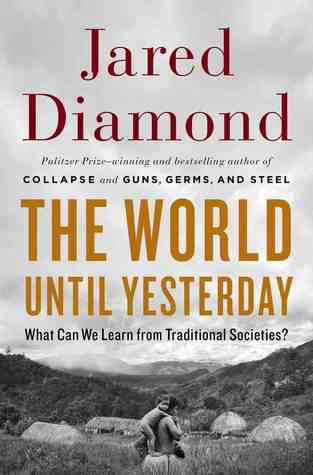Remember that friend of mine I mentioned in a recent post who went on the carb-free diet? We had lunch yesterday, and after having fallen off the wagon over Easter, she was back on with a vengeance, subsisting on leafy vegetables, meat, cheese, and eggs. We were trying to plan a dinner for our book club, but after making a feeble attempt to defend the nutritional virtues of the potato, I waved the white flag and agreed that I would provide some carbs for the rest of us to eat.
Unless you, dear reader, are in a diabetic free-fall, I'm sorry I ever mentioned Gary Taubes' book! Because so much of the joy of food (and life) is the community it builds and the shared delight. Let me stand up again this week in defense of non-leafy vegetables around the world.
Ever since reading his Guns, Germs, and Steel and his follow-up Collapse, I've been a Jared Diamond fan. His latest book, an examination of the traditional societies that characterized the entire planet until a couple thousand years ago, proved a little too much data for me, but I nevertheless read the sections on child-rearing and diet.
Diamond finds, as everyone else does, that normally healthy societies that encounter the Western diet soon suffer from Western health problems:
"When I began working in Papua New Guinea in 1964, the vast majority of New Guineans still lived largely traditional lifestyles in their villages, growing their own food and consuming a low-salt, low-sugar diet. The dietary staples in the Highlands were root crops (sweet potato, taro, and yams) providing about 90% of Highlanders' caloric intake, while the lowland staple was starch grains from the heart of sago palm trees" (p.410).
Good heavens! Starch, starch, and more starch! Surely, Mr. Diamond, the New Guineans must have been frightfully unhealthy? He found, in fact, the opposite:
Not the villain? "Among the many things that impressed me about New Guineans was their physical condition: lean, muscular, physically active, all of them resembling slim Western body-builders. When not carrying loads, they ran along steep mountain trails at a trot, and when carrying heavy loads, they walked all day at my own unencumbered walking pace...During those early years in New Guinea I never saw a single obese or even overweight New Guinean" [ibid].
But how can this be? All those starchy staples are forbidden on just those diets trying to help obese and overweight Westerners stave off metabolic syndrome. Diamond blames not starchy vegetables, but the high sodium and sugar of the processed-food diet, as well its ready availability and abundance. Diabetes levels per capita are highest in countries that rapidly transitioned to the Western diet. Diamond finds "the biggest source of dietary salt in the U.S...is cereal products--bread, other baked goods, and breakfast cereals--which we usually don't think of as being salty" (426). Sugar, of course, is everywhere. Genes that used to ensure survival--the ones that helped us store fat for lean times--now, in a culture of caloric overabundance, do us in.
His recipe for health:
- not smoking;
- exercising regularly;
- limiting our intake of total calories, alcohol, salt and salty foods, sugar and sugared soft drinks, saturated and trans fats, processed foods, butter, cream, and red meat;
- increasing our intake of fiber, fruits and vegetables, calcium, and complex carbohydrates.
- Eat more slowly.
Funny. Three books, three recommended diets, with some contradictions. At least everyone seems to agree on staying away from processed foods. (As a second grader informed me at a school "read-in" last night, "You can eat as many Cheetos as you want, and you'll never feel full!") After that, you're on your own.




